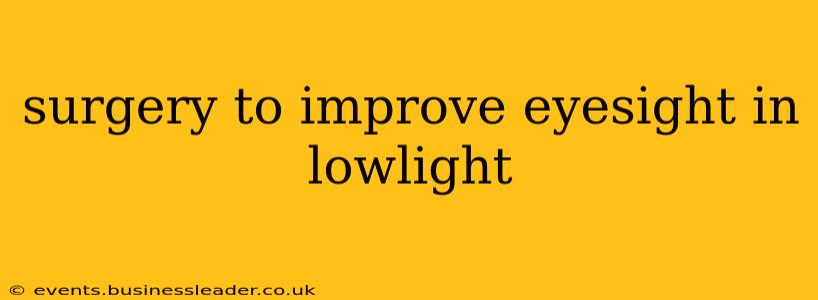Seeing clearly in low light conditions is a common concern, impacting daily activities and overall quality of life. While many factors contribute to low-light vision, some surgical procedures can potentially improve visual acuity in dim environments. However, it's crucial to understand the limitations and realistic expectations before considering any surgical intervention. This article explores the surgical options and addresses frequently asked questions surrounding vision improvement in low light.
What types of surgery can improve night vision?
There isn't a single surgical procedure specifically designed to enhance night vision. The term "night vision" itself is somewhat misleading, as it's not about "seeing in the dark" but rather about improving the ability to see clearly in low-illumination settings. Surgical interventions focus on addressing underlying conditions that impair vision, which may incidentally improve low-light vision as a secondary benefit. These conditions and related surgeries include:
-
Cataract Surgery: Cataracts, the clouding of the eye's lens, significantly reduce vision in all light conditions, including low light. Replacing a cloudy lens with an artificial intraocular lens (IOL) can dramatically improve overall vision, including night vision. Some IOLs are specifically designed to improve contrast sensitivity, potentially leading to better low-light vision than standard IOLs. However, the improvement varies depending on the individual and the pre-existing condition.
-
Refractive Surgery (LASIK, PRK): These procedures correct refractive errors like myopia (nearsightedness), hyperopia (farsightedness), and astigmatism. While not directly aimed at improving night vision, correcting these errors can lead to improved visual acuity overall, which may result in better performance in low-light conditions. However, some patients report increased glare or halos after refractive surgery, potentially worsening night vision.
-
Corneal Transplantation: In cases of severe corneal disease or damage affecting clarity, a corneal transplant can significantly improve vision, potentially leading to better low-light vision as well. This is because a healthy cornea plays a vital role in light transmission and focusing.
Can surgery cure night blindness?
No, surgery cannot cure night blindness (nyctalopia) in all cases. Night blindness encompasses various conditions, many of which are not directly treatable with surgery. Some forms are caused by underlying medical conditions like retinitis pigmentosa, which involves degeneration of the retina. While research is ongoing, there are currently no surgical interventions that effectively reverse retinal degeneration. Surgery might address secondary issues impacting vision, but it won't cure the root cause of the night blindness itself.
What are the risks and side effects of surgery for improving night vision?
The risks and side effects associated with any eye surgery depend heavily on the specific procedure performed. Generally, common risks and side effects include:
- Infection: Infection is a risk with any surgery.
- Dry eyes: Many eye surgeries can lead to temporary or even permanent dry eye syndrome.
- Glare and halos: Especially with refractive surgeries, some patients experience increased glare and halos at night.
- Loss of vision: While rare, there's always a risk of vision loss with any eye surgery.
It's crucial to discuss potential risks and side effects with your ophthalmologist before undergoing any surgical procedure.
Does LASIK improve night vision?
LASIK, while correcting refractive errors, doesn't specifically target night vision improvement. While some individuals may experience improved low-light vision following LASIK, others might report increased glare or halos, negatively affecting their night vision. The outcome is highly individual-dependent.
How can I improve my night vision without surgery?
Several non-surgical methods can improve low-light vision:
- Dietary changes: A diet rich in vitamins A, C, and E, along with lutein and zeaxanthin, can support eye health.
- Lifestyle adjustments: Getting sufficient rest and avoiding excessive screen time can reduce eye strain.
- Vision aids: Using night driving glasses or other vision-enhancing aids can improve visibility in low-light settings.
Before making any decisions about surgical interventions, exploring these non-surgical options and consulting with an ophthalmologist is highly recommended.
What are the different types of IOLs for better night vision?
Various IOLs are available, some designed to enhance contrast sensitivity and potentially improve low-light vision. However, the optimal IOL choice depends on the individual's needs and overall eye health. Your ophthalmologist can guide you toward the most suitable option based on your specific circumstances. The benefits and limitations of each IOL type should be thoroughly discussed before making a decision.
This information is for general knowledge and should not be considered medical advice. Always consult with a qualified ophthalmologist to determine the best course of action for improving your eyesight in low-light conditions.
